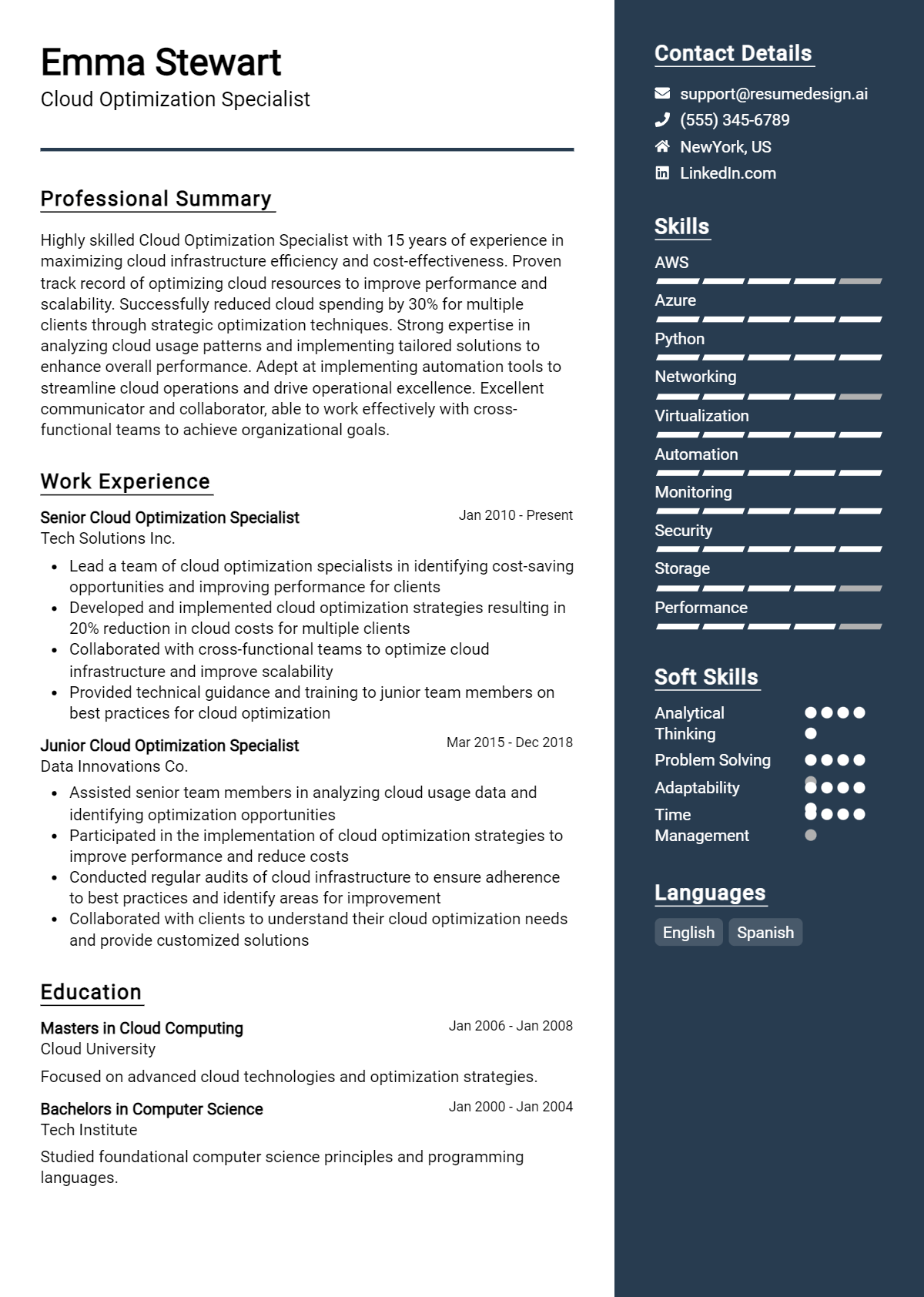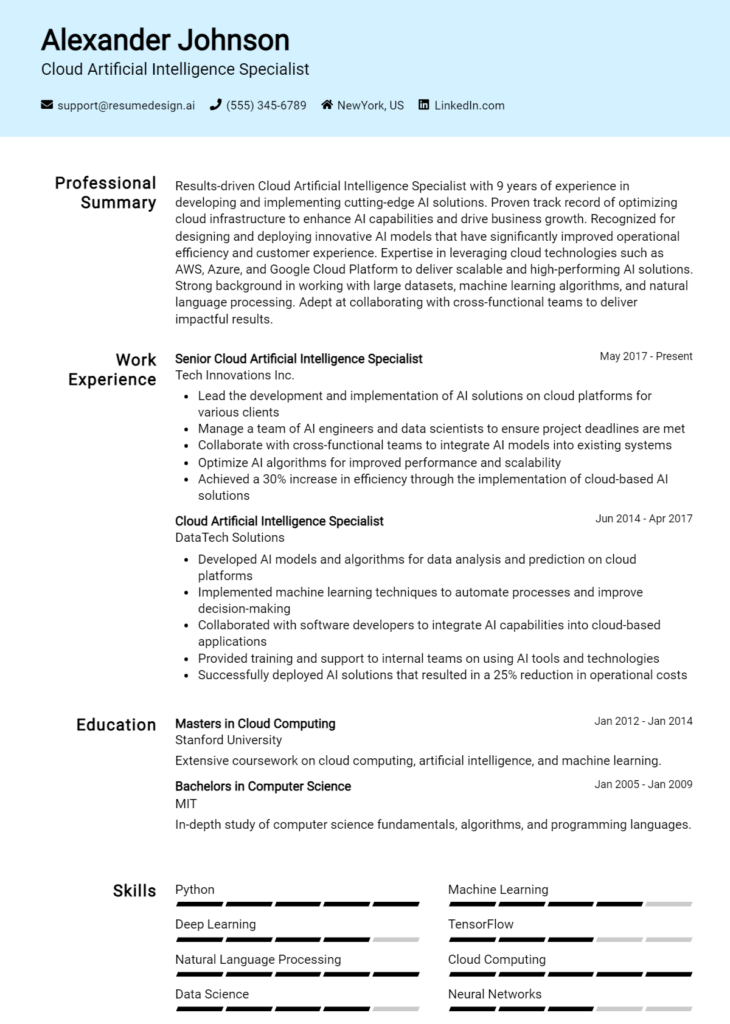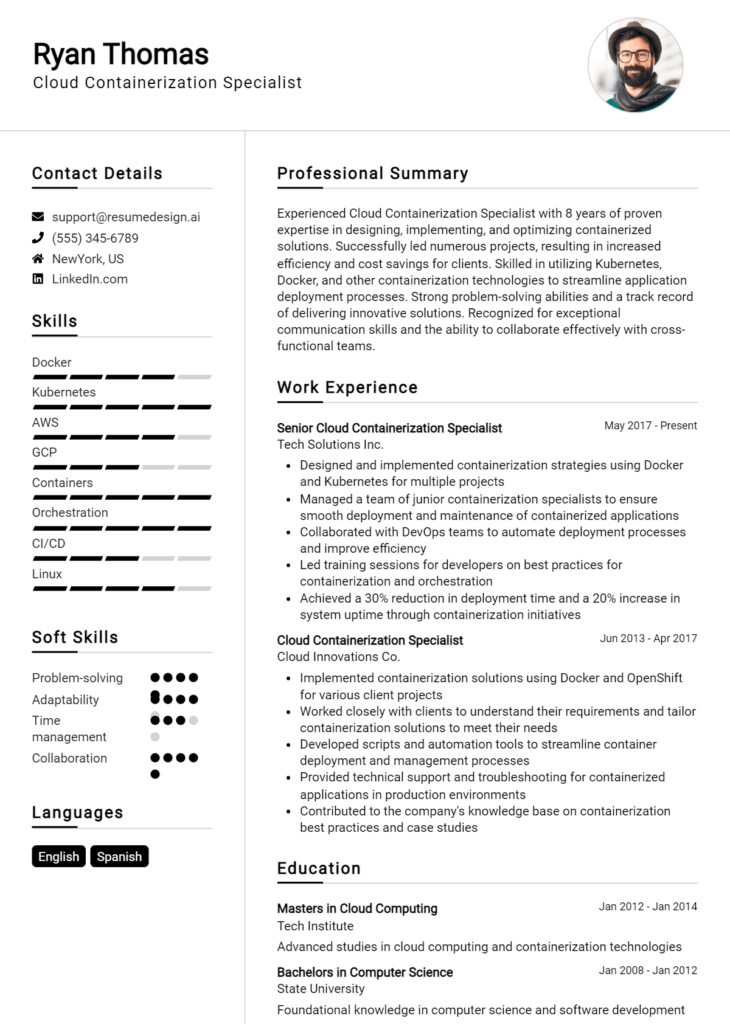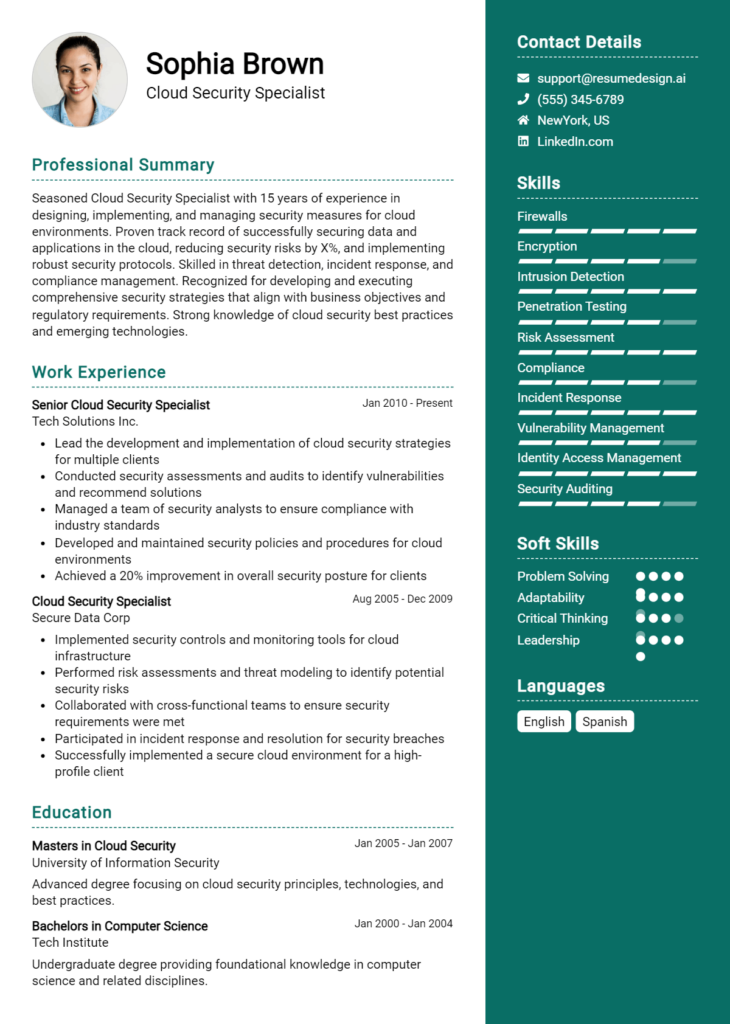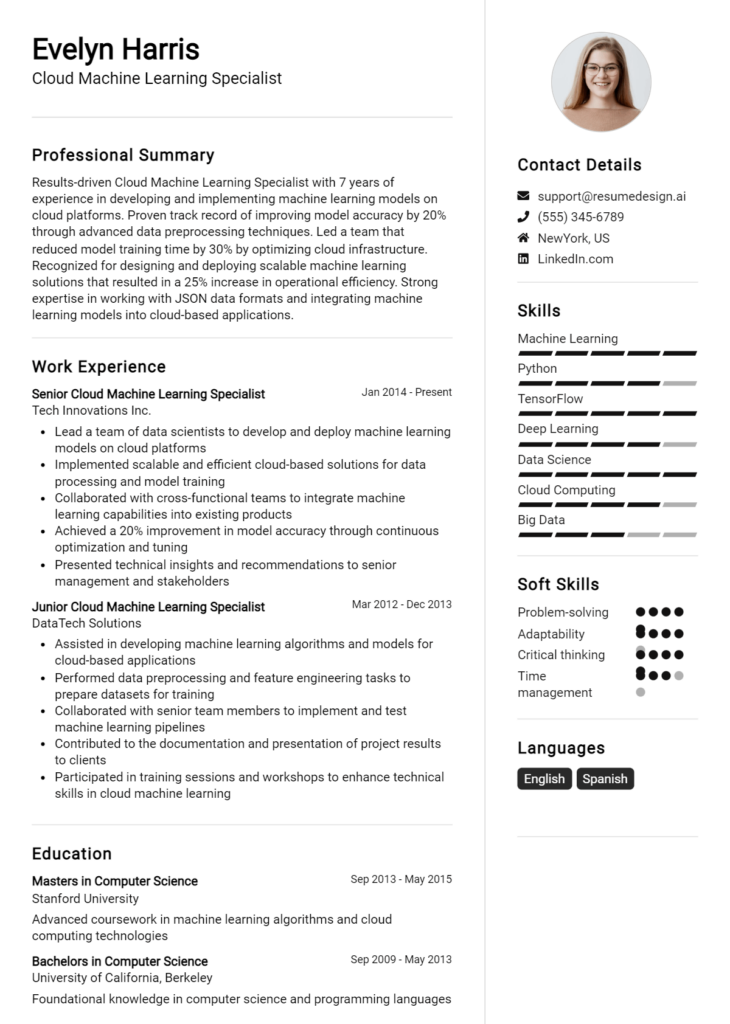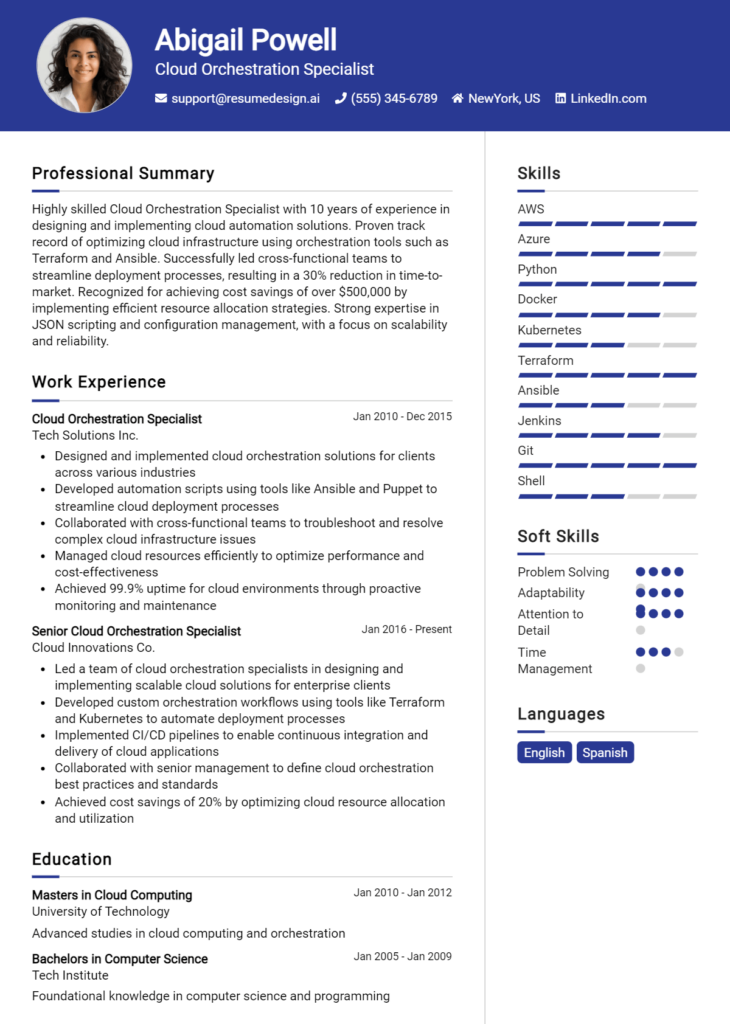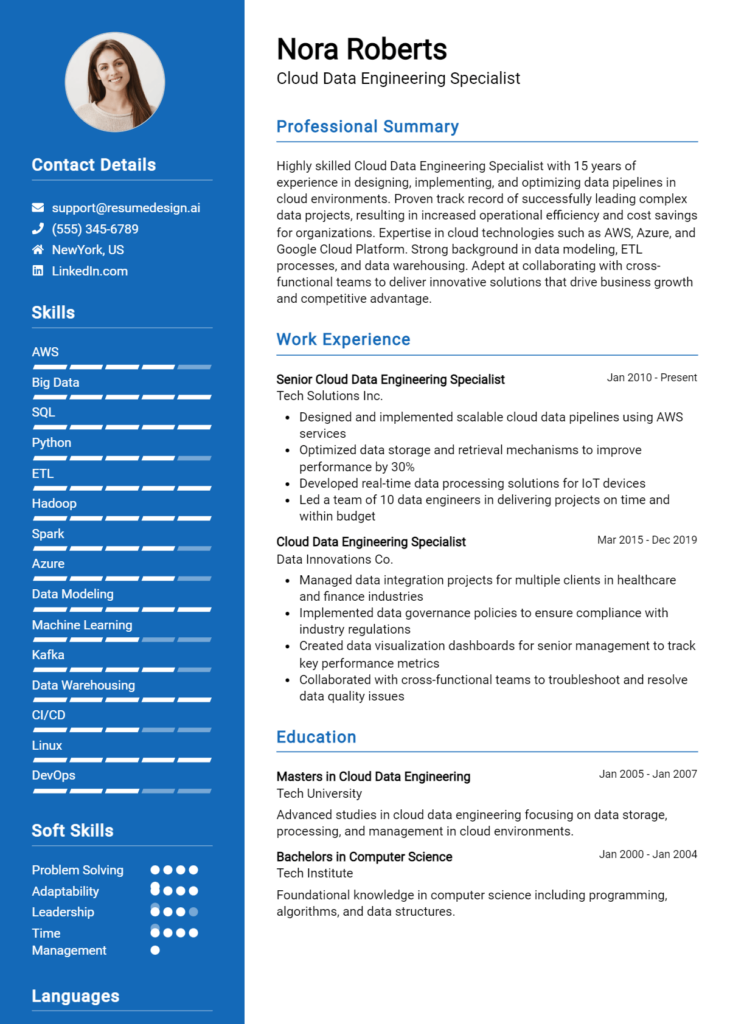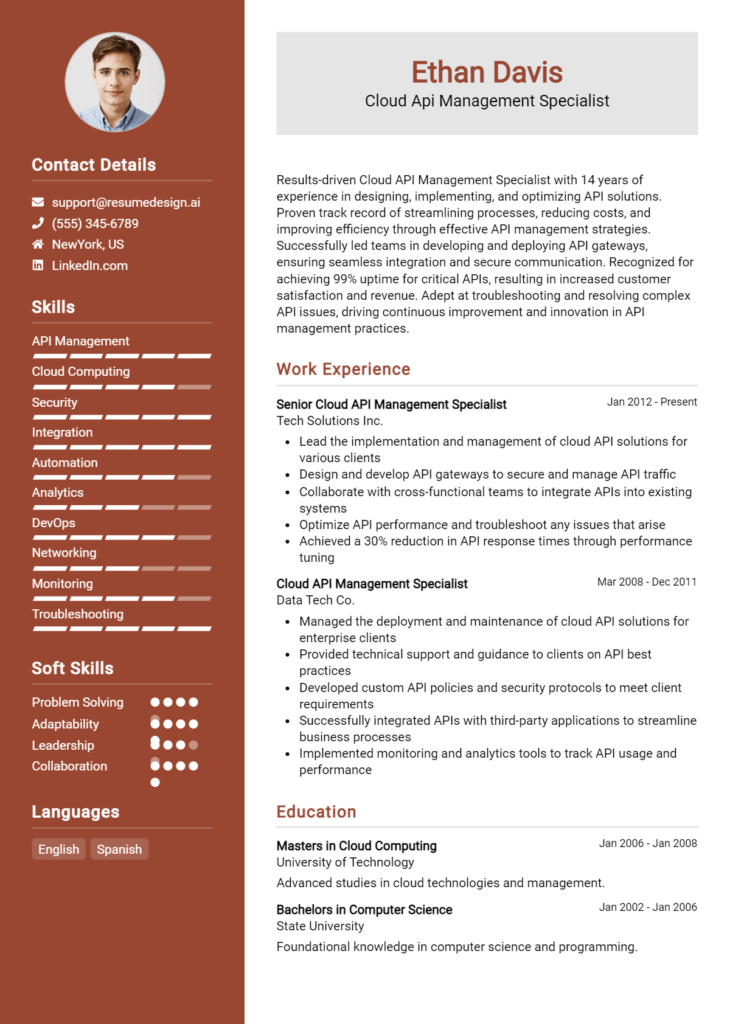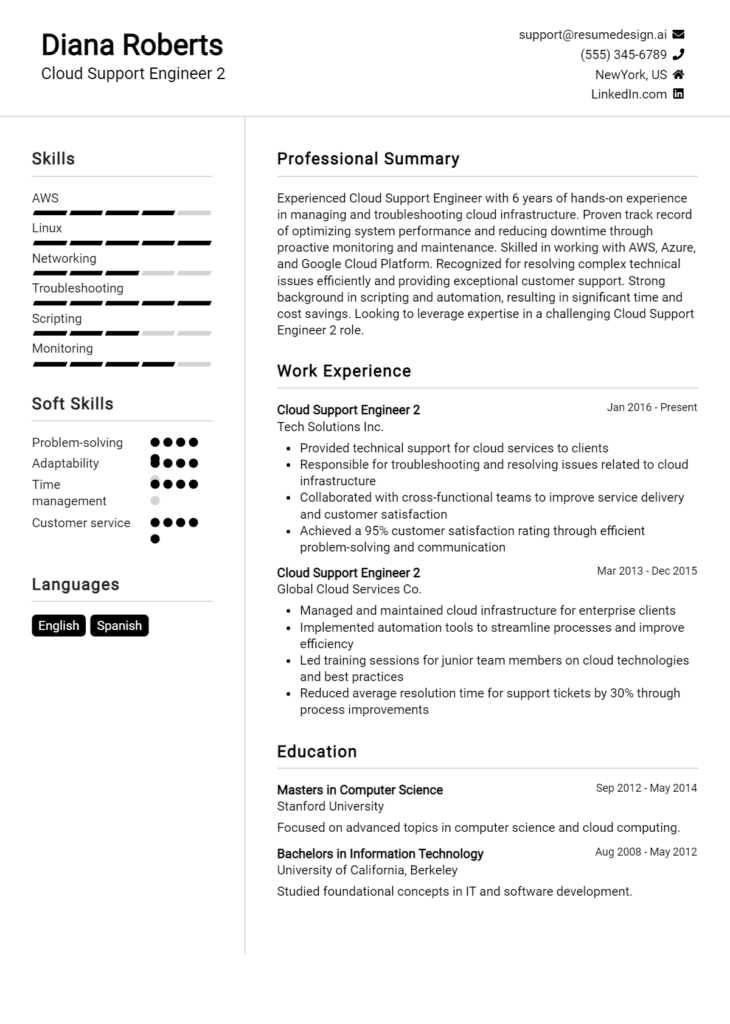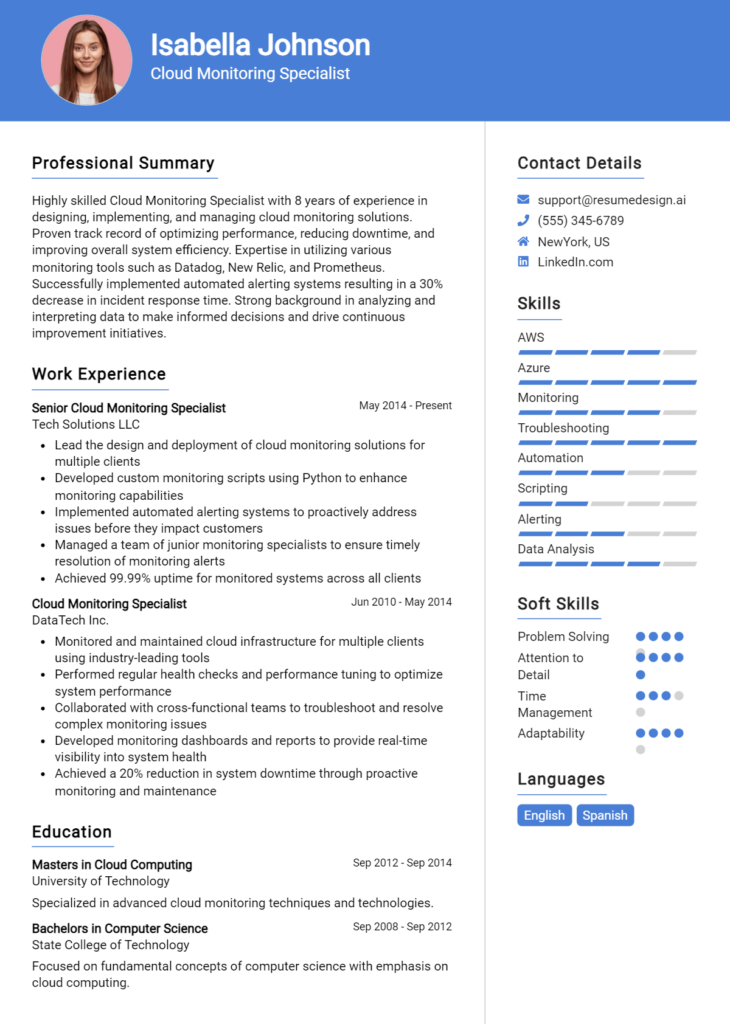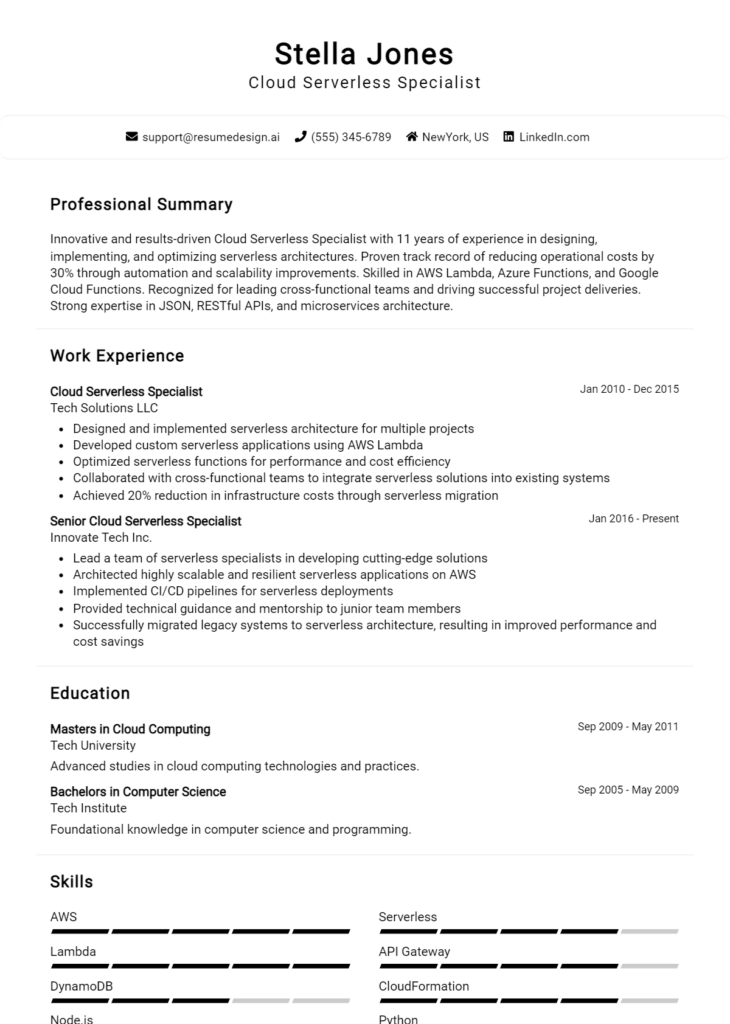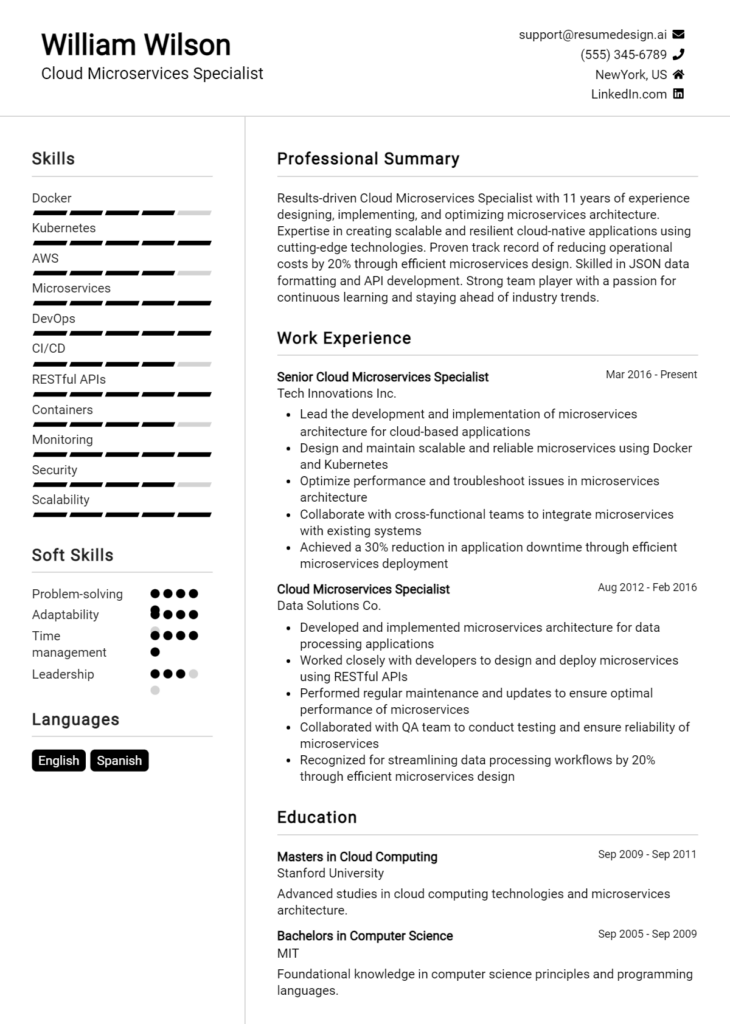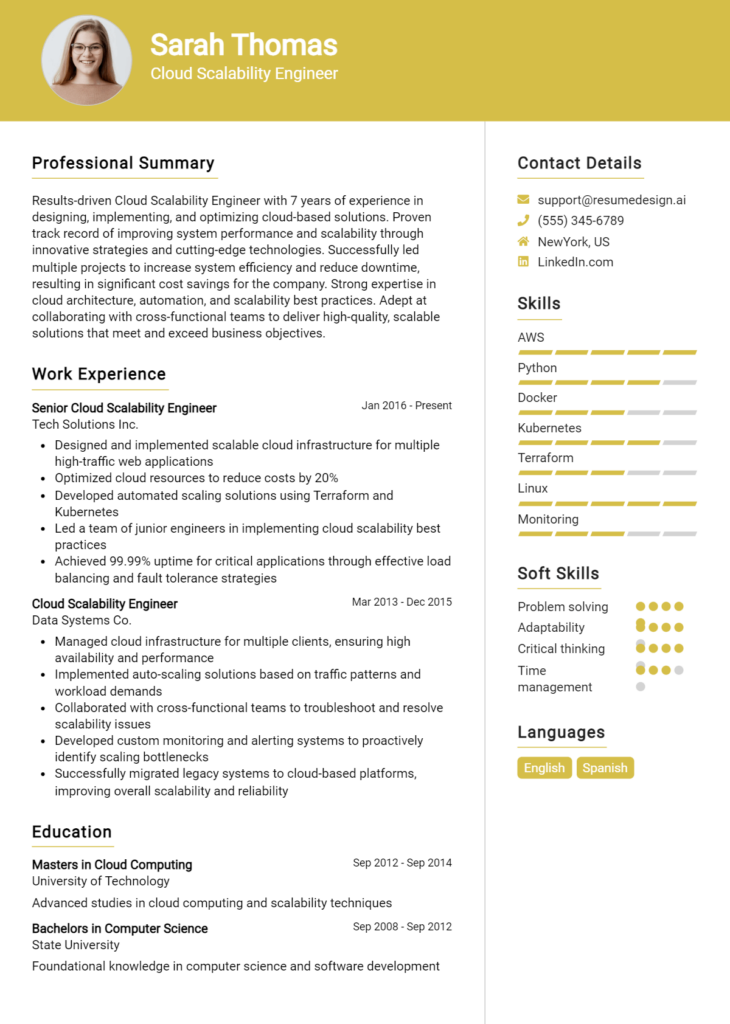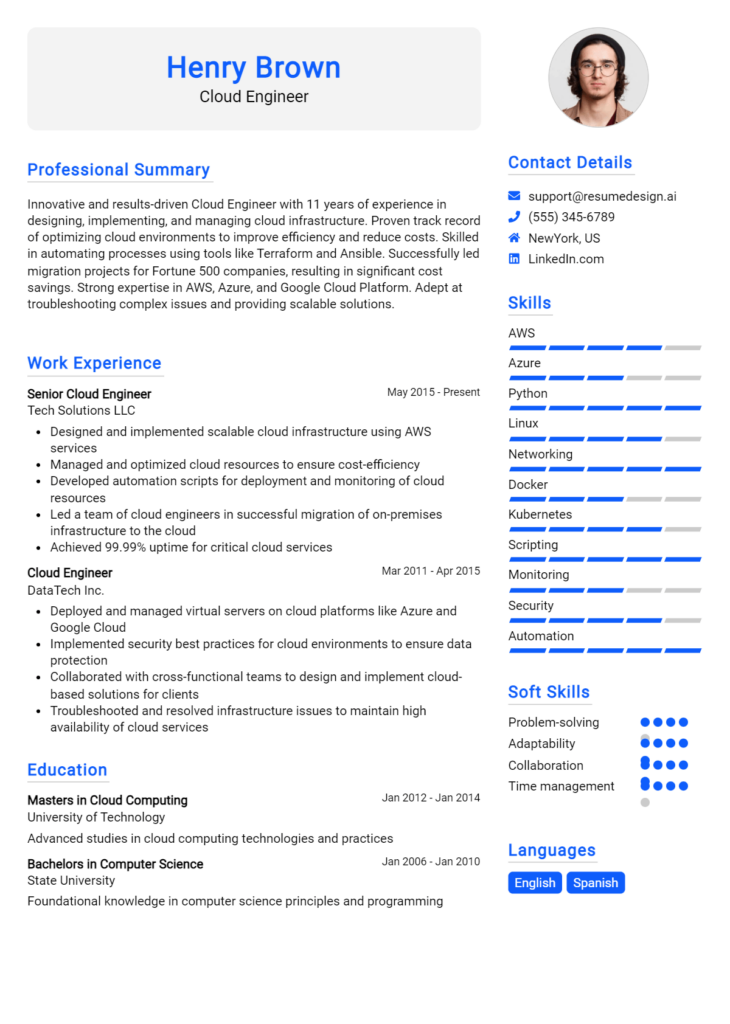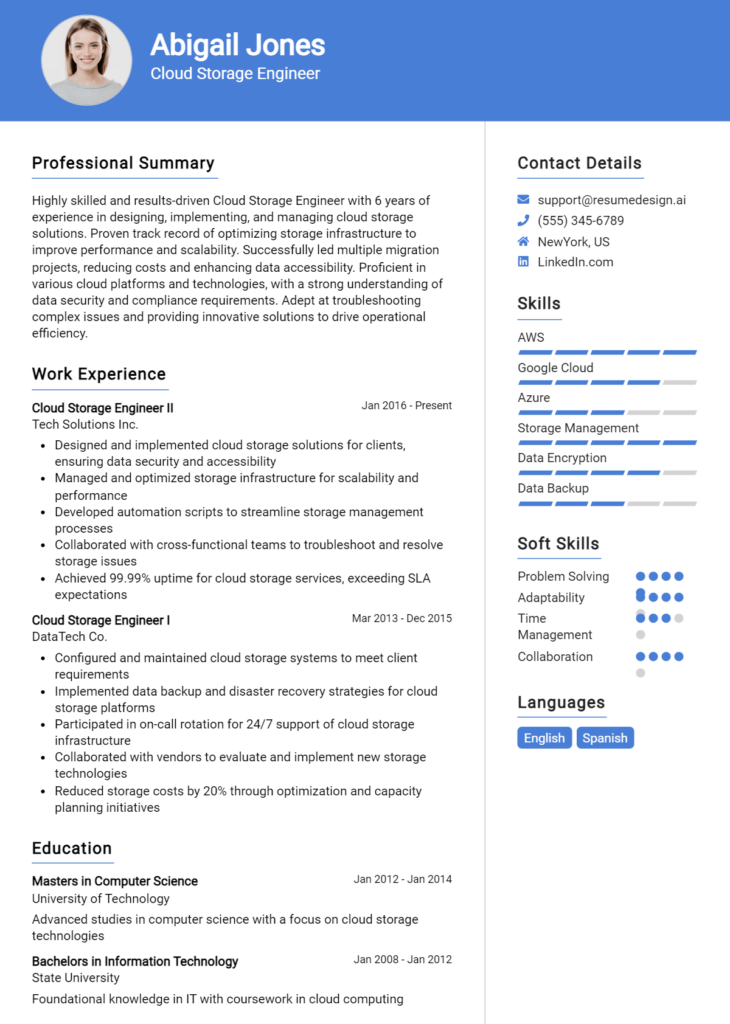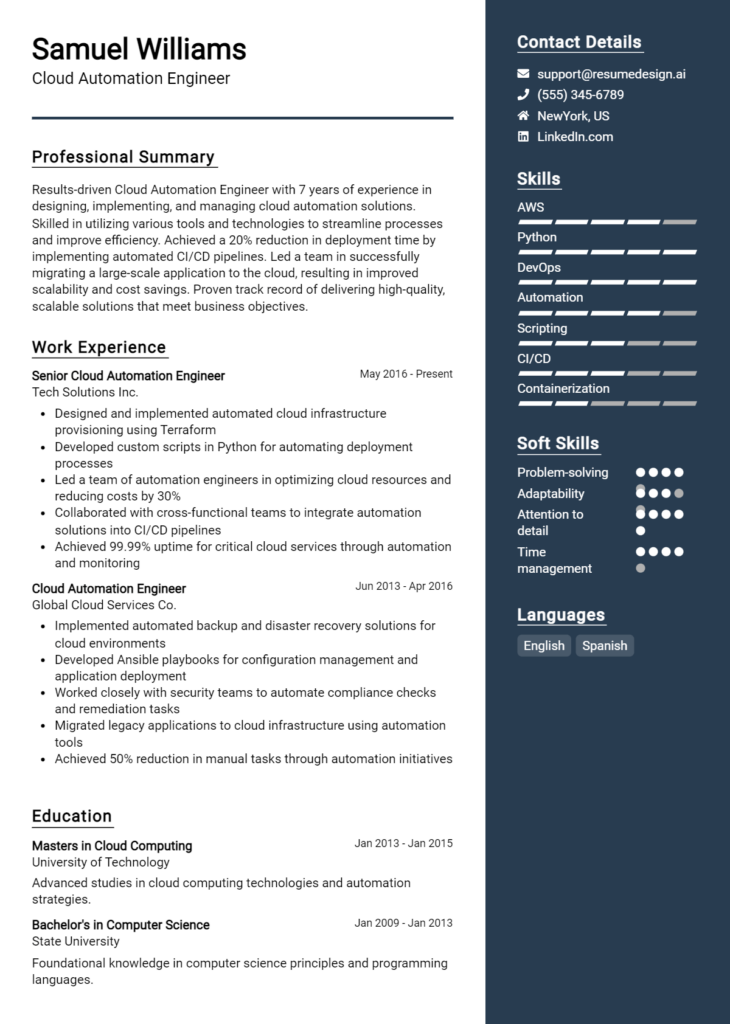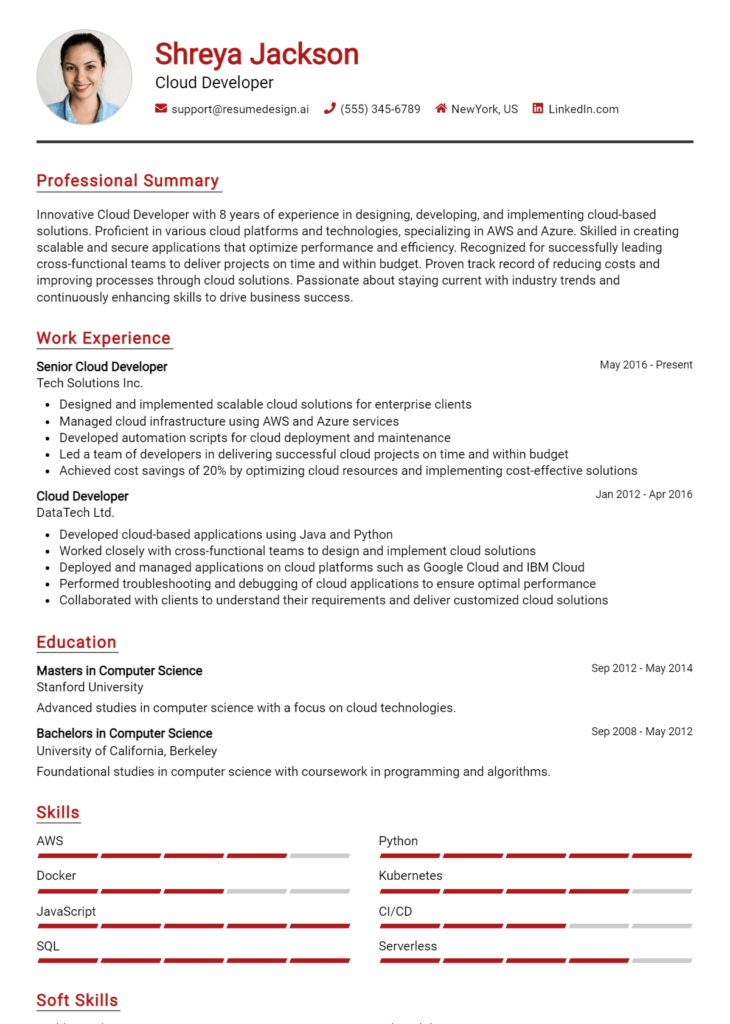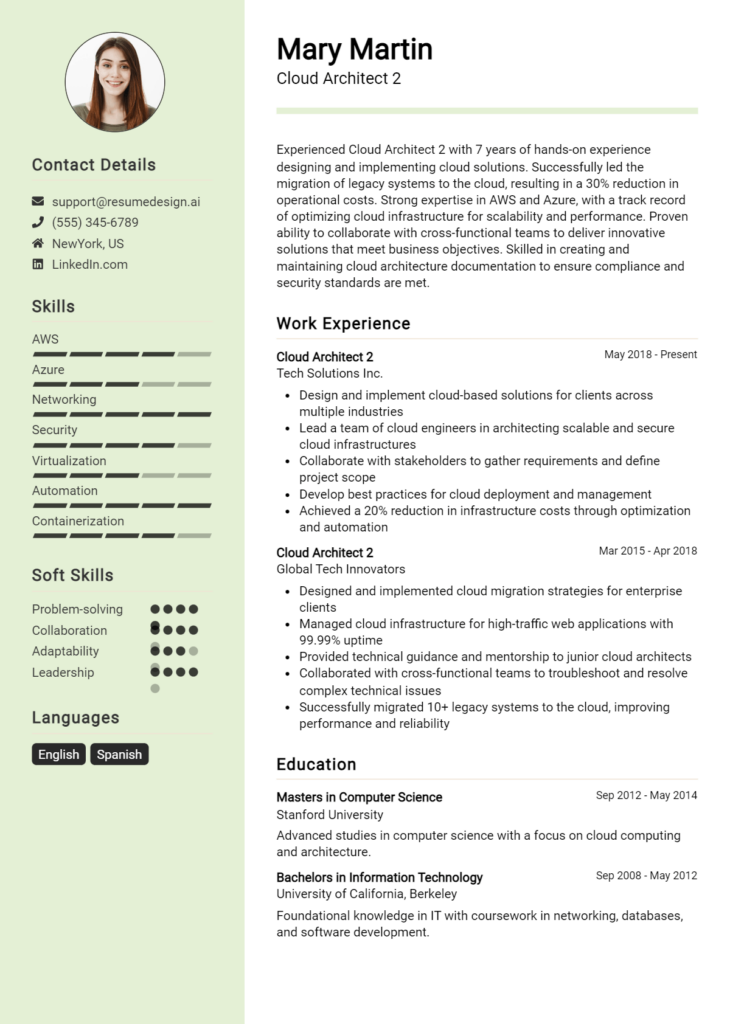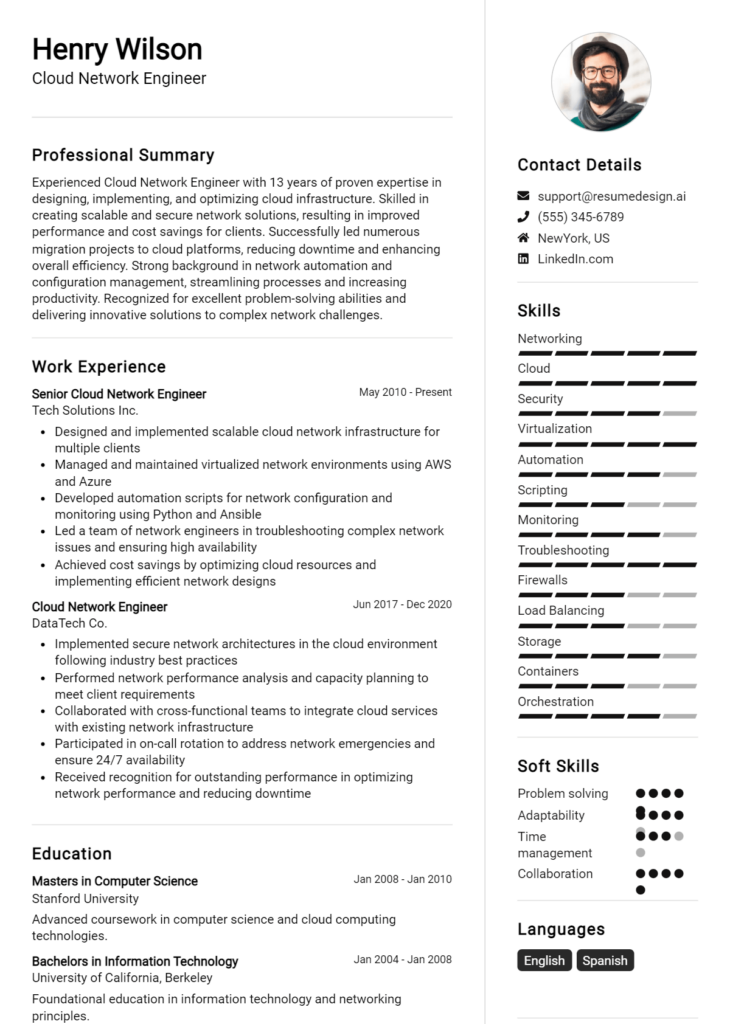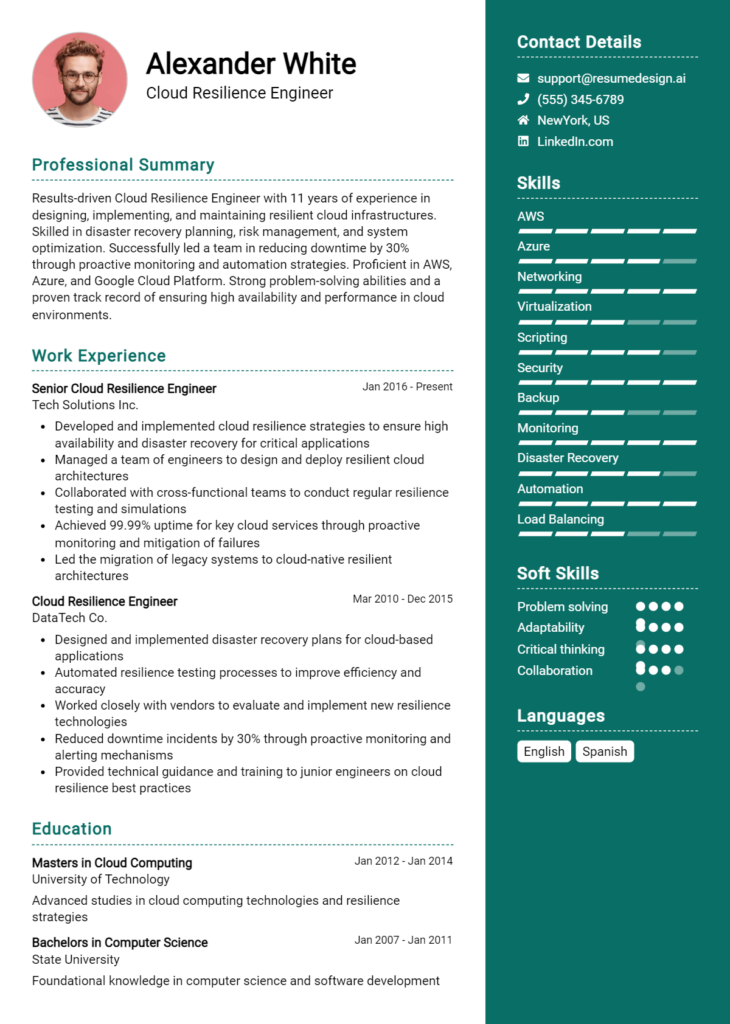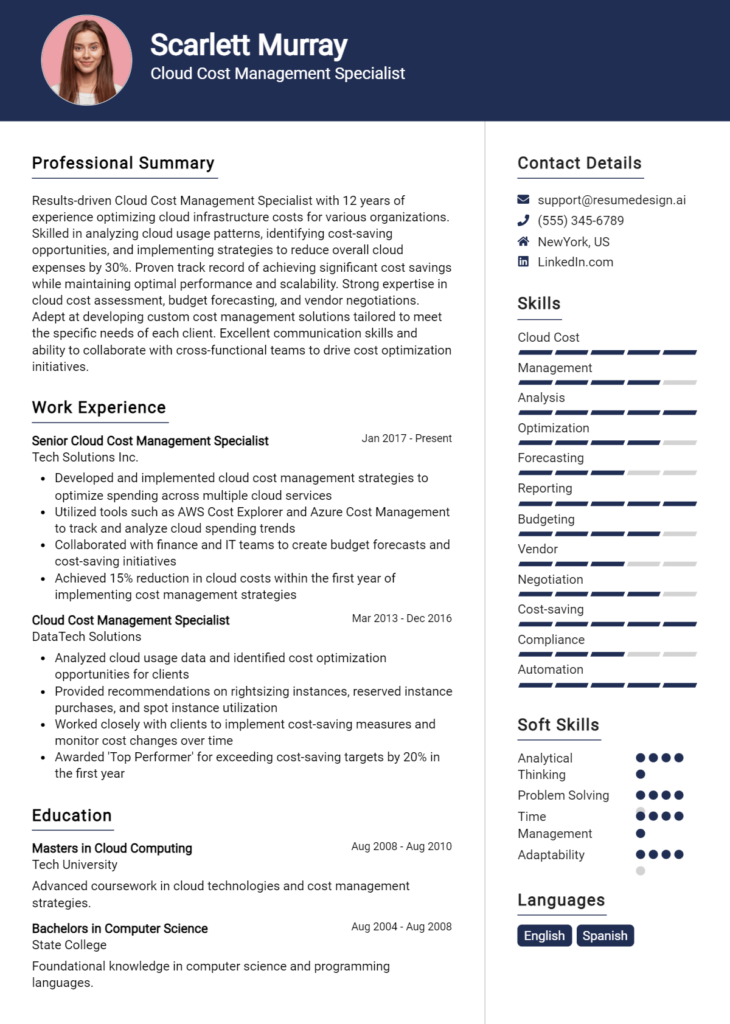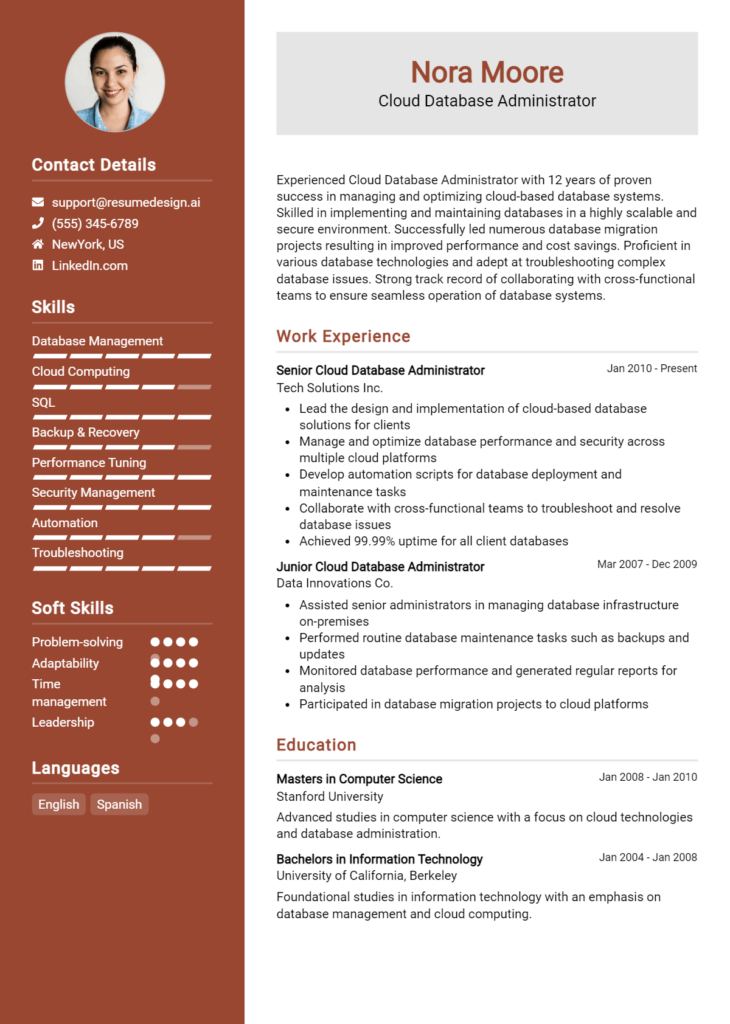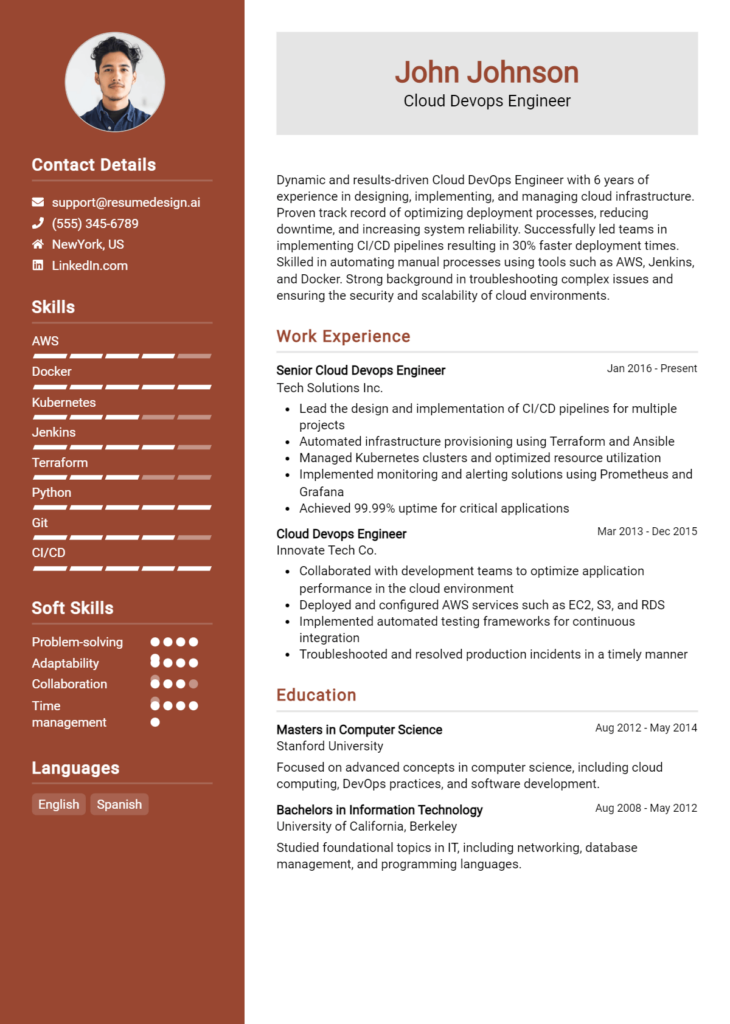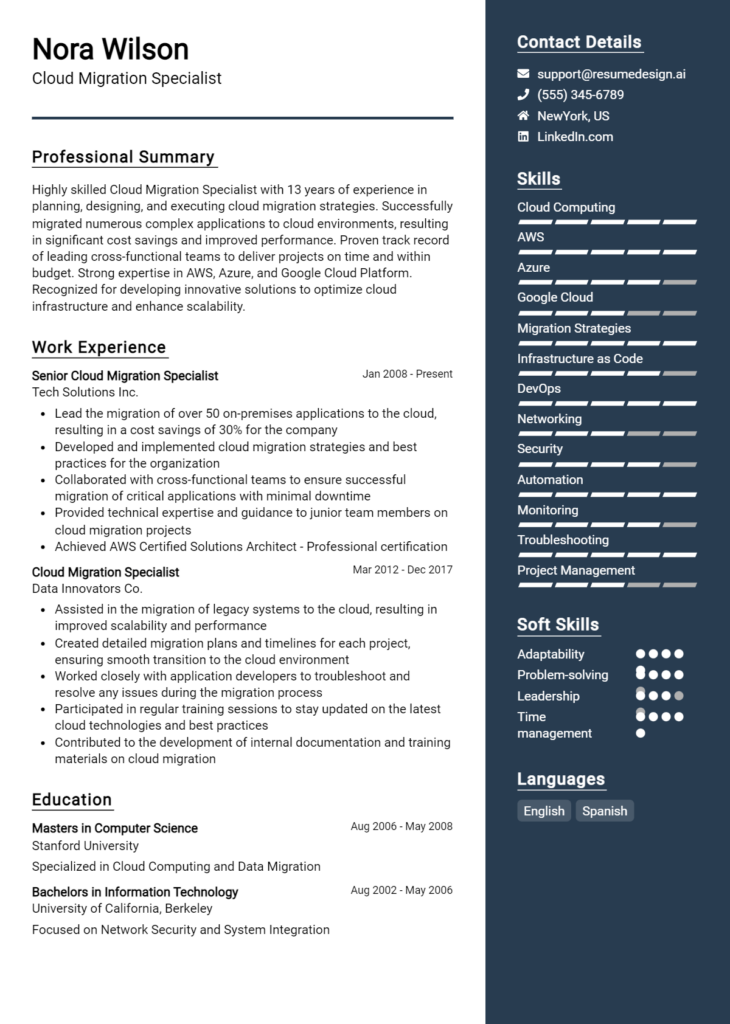Cloud Optimization Specialist Core Responsibilities
A Cloud Optimization Specialist is responsible for enhancing cloud infrastructure's efficiency, cost-effectiveness, and performance across various departments. This role requires a blend of technical expertise in cloud technologies, operational insights, and strong problem-solving skills to identify inefficiencies and recommend improvements. By collaborating with IT, finance, and development teams, they ensure cloud resources align with organizational goals. A well-structured resume highlighting these competencies can effectively showcase a candidate's potential to drive significant value for the organization.
Common Responsibilities Listed on Cloud Optimization Specialist Resume
- Analyze cloud usage patterns to identify cost-saving opportunities.
- Implement automation tools to streamline cloud operations.
- Monitor cloud performance and recommend enhancements.
- Collaborate with cross-functional teams to align cloud strategies.
- Conduct regular audits of cloud resources for compliance and efficiency.
- Develop and maintain documentation for cloud optimization processes.
- Provide training and support to teams on best cloud practices.
- Evaluate new cloud services and technologies for integration.
- Manage and report on cloud expenditure and budget forecasts.
- Identify and mitigate risks associated with cloud services.
- Enhance security protocols for cloud environments.
- Stay updated with industry trends and emerging technologies.
High-Level Resume Tips for Cloud Optimization Specialist Professionals
In today’s competitive job market, a well-crafted resume is essential for Cloud Optimization Specialist professionals looking to make a strong first impression on potential employers. Your resume serves as your initial introduction, capturing attention and showcasing your skills and achievements in the cloud computing realm. It needs to effectively communicate your expertise in optimizing cloud resources and demonstrate your value to prospective employers. This guide will provide practical and actionable resume tips specifically tailored for Cloud Optimization Specialist professionals, ensuring your resume stands out in a crowded field.
Top Resume Tips for Cloud Optimization Specialist Professionals
- Tailor your resume to each job description by incorporating relevant keywords and phrases that align with the specific requirements of the position.
- Highlight your experience with cloud platforms such as AWS, Azure, or Google Cloud, emphasizing any certifications you hold.
- Quantify your achievements by including metrics that demonstrate the impact of your work, such as cost savings or efficiency improvements.
- Showcase your technical skills, including knowledge of cloud architecture, migration strategies, and performance optimization techniques.
- Include relevant projects or case studies that illustrate your problem-solving abilities and successful implementations in cloud environments.
- Utilize clear and concise language, avoiding jargon that may not be understood outside the cloud specialization.
- Incorporate a professional summary at the top of your resume that encapsulates your expertise in cloud optimization and your career objectives.
- List any soft skills that are relevant to the role, such as communication, teamwork, and adaptability, as these are critical for collaboration in cloud projects.
- Ensure your resume format is clean and easy to read, utilizing bullet points and headings to organize information effectively.
By implementing these tips, you can significantly increase your chances of landing a job in the Cloud Optimization Specialist field. A well-structured resume that highlights your skills, achievements, and relevant experience not only captures the attention of hiring managers but also positions you as a strong candidate ready to tackle the challenges of cloud optimization.
Why Resume Headlines & Titles are Important for Cloud Optimization Specialist
In the competitive field of cloud optimization, a Cloud Optimization Specialist plays a vital role in enhancing the efficiency and performance of cloud systems. To stand out in this dynamic job market, crafting a compelling resume headline or title is essential. A strong resume headline serves as the first impression for hiring managers, summarizing a candidate's key qualifications in a succinct and impactful manner. By encapsulating relevant skills, experiences, and accomplishments in a few powerful words, candidates can immediately draw attention to their resumes, increasing the likelihood of landing an interview. The headline should be concise, relevant, and directly related to the position being applied for, ensuring that it resonates with potential employers.
Best Practices for Crafting Resume Headlines for Cloud Optimization Specialist
- Keep it concise: Aim for a headline that is brief yet informative, ideally under 10 words.
- Be role-specific: Tailor the headline to reflect the specific position of Cloud Optimization Specialist.
- Highlight key skills: Include essential skills that are relevant to cloud optimization, such as cost reduction, performance tuning, or resource management.
- Use action-oriented language: Start with strong verbs that convey your impact, such as "Optimized," "Enhanced," or "Maximized."
- Showcase achievements: If possible, include quantifiable achievements that demonstrate your effectiveness in previous roles.
- Avoid jargon: Use clear language that is easily understood by hiring managers and avoids overly technical terms.
- Reflect industry trends: Incorporate current industry keywords that align with the job description.
- Test variations: Experiment with different headlines to see which resonates best with potential employers.
Example Resume Headlines for Cloud Optimization Specialist
Strong Resume Headlines
"Cloud Optimization Expert with Proven Cost Reduction Strategies"
"Results-Driven Cloud Specialist Focused on Performance Enhancements"
"Experienced Cloud Architect Specializing in Resource Efficiency"
"Innovative Cloud Optimization Specialist with 5+ Years in System Performance"
Weak Resume Headlines
"Looking for a Job in Cloud"
"Cloud Specialist with Some Experience"
"Resume for Cloud Optimization Position"
The strong headlines are effective because they immediately communicate the candidate's expertise and specific contributions to cloud optimization, using clear and impactful language that resonates with hiring managers. They highlight relevant skills and achievements, thereby setting the candidate apart in a competitive job market. In contrast, the weak headlines fail to impress due to their vagueness and lack of specificity. They do not convey unique qualifications or demonstrate the candidate's value, ultimately making them less memorable and less likely to capture the attention of potential employers.
Writing an Exceptional Cloud Optimization Specialist Resume Summary
Writing an exceptional resume summary is crucial for a Cloud Optimization Specialist, as it serves as the first impression to hiring managers. A well-crafted summary succinctly highlights key skills, relevant experience, and notable accomplishments, allowing candidates to stand out in a competitive job market. By quickly capturing the attention of recruiters, a strong summary can make a significant difference in whether a candidate progresses to the interview stage. It should be concise, impactful, and tailored to the specific job description, ensuring that it resonates with the needs and expectations of potential employers.
Best Practices for Writing a Cloud Optimization Specialist Resume Summary
- Quantify Achievements: Use numbers and metrics to demonstrate the impact of your work, such as cost savings or performance improvements.
- Focus on Relevant Skills: Highlight the specific skills that align with the job description, such as cloud service management, cost analysis, or automation expertise.
- Tailor the Summary: Customize your summary for each job application to reflect the requirements and responsibilities outlined in the job description.
- Use Action-Oriented Language: Begin sentences with strong action verbs to convey a sense of proactivity and results-oriented work.
- Keep it Concise: Limit the summary to 3-5 sentences, ensuring clarity and focus without overwhelming the reader.
- Highlight Certifications and Tools: Mention relevant certifications and technologies that reinforce your qualifications, such as AWS Certified Solutions Architect or Azure DevOps.
- Showcase Soft Skills: Include soft skills that are important for collaboration and communication in cloud optimization roles, like problem-solving and teamwork.
Example Cloud Optimization Specialist Resume Summaries
Strong Resume Summaries
Results-driven Cloud Optimization Specialist with over 5 years of experience in reducing cloud infrastructure costs by 30% through strategic resource management and automation. Proven expertise in AWS and Azure platforms, leveraging data analytics to enhance performance and scalability.
Dynamic Cloud Optimization Specialist with a track record of implementing cost-saving measures that achieved a 25% reduction in cloud expenditure for Fortune 500 clients. Skilled in cloud architecture design, performance monitoring, and optimizing workflows using industry-leading tools.
Accomplished Cloud Optimization Specialist with a focus on maximizing cloud efficiency, evidenced by successfully migrating 10+ applications to a cloud environment, resulting in a 40% improvement in deployment speed. Experienced in utilizing Terraform and CloudFormation for infrastructure as code (IaC).
Weak Resume Summaries
Cloud Optimization Specialist with experience in cloud technologies looking for new opportunities.
Detail-oriented professional skilled in various cloud services and seeking to make an impact in the field of cloud optimization.
The examples of strong resume summaries are considered effective because they provide specific quantifiable achievements, relevant skills, and a clear indication of the candidate's expertise in cloud optimization. In contrast, the weak summaries lack detail and fail to convey concrete outcomes or unique qualifications, making them less impactful and memorable to hiring managers.
Work Experience Section for Cloud Optimization Specialist Resume
The work experience section of a Cloud Optimization Specialist resume is pivotal in demonstrating the candidate's technical skills, leadership capabilities, and successful delivery of high-quality products. This section not only outlines the professional journey but also illustrates the impact of the candidate's contributions to cloud optimization initiatives. By quantifying achievements and aligning experiences with industry standards, candidates can effectively communicate their value to potential employers, showcasing their ability to enhance cloud performance, reduce costs, and lead teams in implementing innovative solutions.
Best Practices for Cloud Optimization Specialist Work Experience
- Highlight relevant technical skills such as cloud architecture, cost management, and performance tuning.
- Quantify achievements using metrics, such as percentage reductions in costs or improvements in performance.
- Demonstrate leadership by detailing experiences managing teams and projects.
- Align experiences with industry standards and best practices relevant to cloud optimization.
- Use action verbs to convey a sense of ownership and initiative.
- Include collaboration examples that showcase teamwork and cross-functional communication.
- Tailor the experiences to match the job description and requirements of the desired position.
- Focus on outcomes rather than just responsibilities to emphasize contributions.
Example Work Experiences for Cloud Optimization Specialist
Strong Experiences
- Led a cloud migration project that reduced operational costs by 30% while improving system uptime by 20% through effective resource allocation and optimization strategies.
- Implemented a cloud cost management program that identified inefficiencies, resulting in a savings of $150,000 annually for a mid-sized enterprise.
- Collaborated with cross-functional teams to design and deploy a cloud-native application, reducing deployment time by 40% and enhancing user satisfaction scores by 25%.
- Managed a team of five cloud engineers to optimize infrastructure, achieving a 99.9% uptime SLA and receiving recognition from executive management for outstanding performance.
Weak Experiences
- Worked on various cloud projects without specifying roles or contributions.
- Assisted team members with cloud-related tasks, but did not quantify impact or results.
- Participated in meetings to discuss cloud strategies without detailing the outcomes or follow-up actions.
- Responsible for supporting cloud operations with no clear achievements or metrics to highlight effectiveness.
The examples of strong experiences illustrate clear, quantifiable outcomes and demonstrate the candidate's leadership and collaboration skills in meaningful ways. In contrast, the weak experiences lack specificity and measurable results, making it difficult for potential employers to gauge the candidate's impact or effectiveness in previous roles. Strong examples provide a compelling narrative of a candidate’s contributions, while weak examples leave much to be desired in terms of clarity and impact.
Education and Certifications Section for Cloud Optimization Specialist Resume
The education and certifications section of a Cloud Optimization Specialist resume is crucial as it showcases the candidate's academic background and the relevant qualifications that demonstrate their expertise in cloud technologies. This section not only highlights formal education but also emphasizes industry-recognized certifications and continuous learning efforts that are essential in the rapidly evolving field of cloud computing. By providing relevant coursework, certifications, and specialized training, candidates can significantly enhance their credibility and demonstrate their alignment with the specific requirements of the job role, making them more competitive in the job market.
Best Practices for Cloud Optimization Specialist Education and Certifications
- Prioritize certifications from recognized cloud service providers such as AWS, Azure, or Google Cloud.
- Include relevant coursework that directly relates to cloud optimization, architecture, and management.
- Highlight any advanced degrees in fields such as Computer Science, Information Technology, or Data Science.
- List certifications that demonstrate proficiency in cloud optimization tools and methodologies.
- Specify the dates of certification to show current knowledge and skills.
- Include specialized training or workshops that enhance your understanding of cloud cost management and performance tuning.
- Emphasize any leadership or project management training that supports your role as a Cloud Optimization Specialist.
- Keep the section concise and focused on the most relevant qualifications.
Example Education and Certifications for Cloud Optimization Specialist
Strong Examples
- M.S. in Cloud Computing from Stanford University, 2022
- AWS Certified Solutions Architect – Professional, obtained in 2023
- Google Cloud Professional Cloud Architect certification, completed in 2022
- Coursework in Cloud Infrastructure and Optimization Strategies at MIT xPRO
Weak Examples
- B.A. in History from a non-technical institution, 2010
- Certifications in outdated technologies such as Oracle 9i Database Administrator, obtained in 2005
- General IT certification without a focus on cloud technologies, such as CompTIA A+
- Coursework in unrelated fields such as Art History or Literature
The strong examples are considered strong because they directly relate to the skills and knowledge required for a Cloud Optimization Specialist, showcasing relevant degrees, current certifications, and specialized coursework that align with industry demands. In contrast, the weak examples are deemed weak due to their irrelevance to the cloud optimization field, either by focusing on outdated technologies or unrelated educational backgrounds that do not contribute to the candidate's qualifications for the role.
Top Skills & Keywords for Cloud Optimization Specialist Resume
In today's rapidly evolving technological landscape, the role of a Cloud Optimization Specialist has become increasingly vital for organizations seeking to maximize their cloud investments. A well-crafted resume that highlights relevant skills can significantly enhance a candidate's appeal to potential employers. Skills not only reflect a professional's technical capabilities but also demonstrate their ability to adapt and contribute to an organization's cloud strategy effectively. By showcasing both hard and soft skills, candidates can present a comprehensive picture of their qualifications, making them stand out in a competitive job market. For more insights on how to effectively present your skills, check out this resource on skills.
Top Hard & Soft Skills for Cloud Optimization Specialist
Hard Skills
- Cloud Computing Platforms (AWS, Azure, Google Cloud)
- Cost Management and Optimization Techniques
- Cloud Architecture Design
- Infrastructure as Code (IaC)
- Cloud Security Best Practices
- Performance Monitoring Tools
- Automation and Scripting (Python, Bash)
- Data Migration Strategies
- API Management
- Containerization (Docker, Kubernetes)
- Network Configuration and Management
- Load Balancing Techniques
- Disaster Recovery Planning
- DevOps Practices
- Scalability Solutions
- Compliance and Regulatory Knowledge
- Virtualization Technologies
Soft Skills
- Analytical Thinking
- Problem-Solving
- Effective Communication
- Team Collaboration
- Project Management
- Adaptability
- Attention to Detail
- Time Management
- Customer Service Orientation
- Critical Thinking
- Conflict Resolution
- Initiative and Self-Motivation
- Creativity
- Interpersonal Skills
- Strategic Planning
- Decision-Making
- Negotiation Skills
For additional guidance on how to showcase your work experience effectively, consider highlighting specific projects or achievements that demonstrate your expertise in cloud optimization.
Stand Out with a Winning Cloud Optimization Specialist Cover Letter
As a highly skilled Cloud Optimization Specialist with a strong background in cloud infrastructure management and cost efficiency, I am excited to apply for the position at your organization. With over five years of experience in optimizing cloud environments for companies of various sizes, I have honed my ability to analyze usage patterns, implement best practices, and leverage cloud technologies to drive significant improvements in performance and cost savings. My passion for cloud solutions and my commitment to maximizing resource utilization make me a perfect fit for your team.
In my previous role at XYZ Corp, I successfully led a project that reduced cloud expenditures by 30% while improving system performance through the implementation of automated scaling and resource tagging. By conducting thorough audits of existing cloud environments and collaborating with cross-functional teams, I identified key areas for improvement and developed tailored strategies that aligned with business objectives. My technical knowledge in AWS, Azure, and Google Cloud, combined with my analytical skills, enables me to provide actionable insights and recommendations that deliver measurable results.
I am particularly drawn to your organization because of its commitment to innovation and excellence in cloud services. I am eager to contribute my expertise in cloud optimization to help your team enhance operational efficiency and drive sustainable growth. I believe that my proactive approach, along with my ability to communicate complex concepts in an understandable manner, will make me a valuable asset as we work together to optimize cloud resources and achieve our collective goals.
Thank you for considering my application. I am looking forward to the opportunity to discuss how my skills and experiences align with the needs of your organization. I am excited about the possibility of contributing to your team and helping to shape the future of your cloud strategy.
Common Mistakes to Avoid in a Cloud Optimization Specialist Resume
When crafting a resume for the role of a Cloud Optimization Specialist, it’s crucial to present your skills and experiences in a way that highlights your expertise and value to potential employers. However, many candidates make common mistakes that can undermine their chances of landing an interview. Understanding these pitfalls can help you create a more effective and compelling resume. Here are some common mistakes to avoid:
Vague Job Titles: Using generic job titles instead of specific roles can leave hiring managers confused about your expertise. Clearly state your previous job titles to accurately reflect your experience.
Lack of Metrics: Failing to include quantifiable achievements diminishes the impact of your accomplishments. Use specific numbers to demonstrate how you improved cloud efficiency or reduced costs.
Ignoring Relevant Skills: Omitting key technical skills that are relevant to cloud optimization can make your resume less attractive. Ensure you highlight cloud platforms, tools, and methodologies pertinent to the role.
Overly Technical Language: Using jargon or overly complex technical language can alienate recruiters who may not have a strong technical background. Aim for clarity and simplicity while still showcasing your technical expertise.
Not Tailoring the Resume: Submitting a generic resume for every application can hurt your chances. Tailor your resume for each position by emphasizing the experiences and skills that align with the job description.
Neglecting Soft Skills: Focusing solely on technical abilities can overlook the importance of soft skills such as communication, teamwork, and problem-solving. Highlight these skills to demonstrate your ability to collaborate effectively.
Poor Formatting: A cluttered or hard-to-read layout can detract from your content. Use clear headings, bullet points, and consistent formatting to enhance readability and professionalism.
Excessive Length: Writing an overly long resume can overwhelm hiring managers. Aim for a concise document that highlights your most relevant experience and skills, ideally keeping it to one or two pages.
Conclusion
As a Cloud Optimization Specialist, you play a crucial role in ensuring that cloud resources are utilized efficiently and cost-effectively. In this article, we discussed the importance of understanding various cloud platforms, mastering optimization strategies, and keeping up with industry trends. We also highlighted the significance of analytical skills and the ability to implement automation tools to streamline processes.
Your expertise in managing cloud costs, enhancing performance, and ensuring security can make a significant impact on an organization’s bottom line. As the demand for cloud services continues to grow, so does the need for skilled professionals in this field.
To ensure your resume reflects your expertise and stands out to potential employers, we encourage you to take a moment to review and update your Cloud Optimization Specialist resume. Utilize valuable resources available to you, such as resume templates, which can provide a visually appealing structure; the resume builder, which simplifies the creation process; resume examples to inspire your content; and cover letter templates to help you craft a compelling introduction.
Invest in your career by optimizing your resume today!

